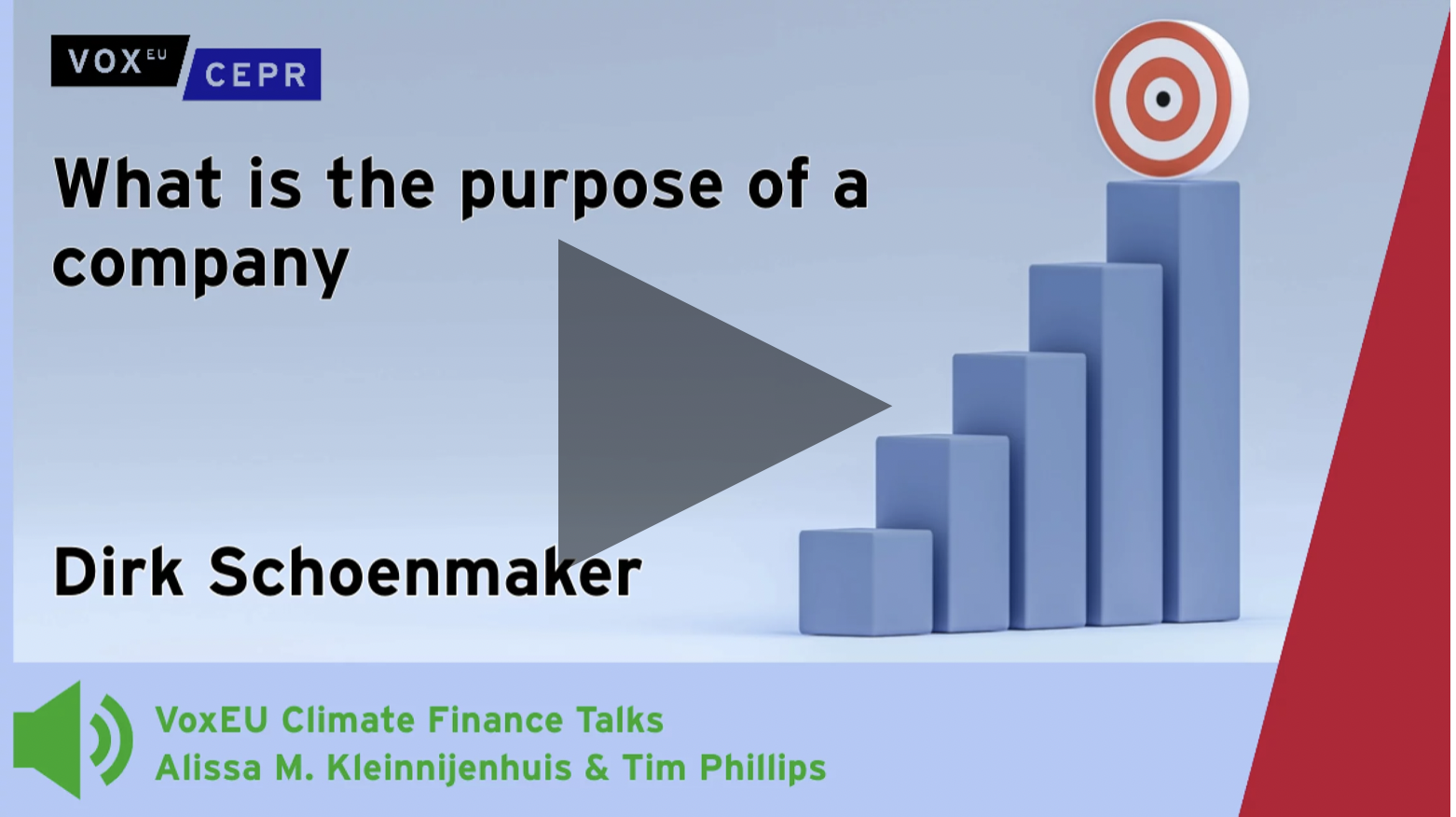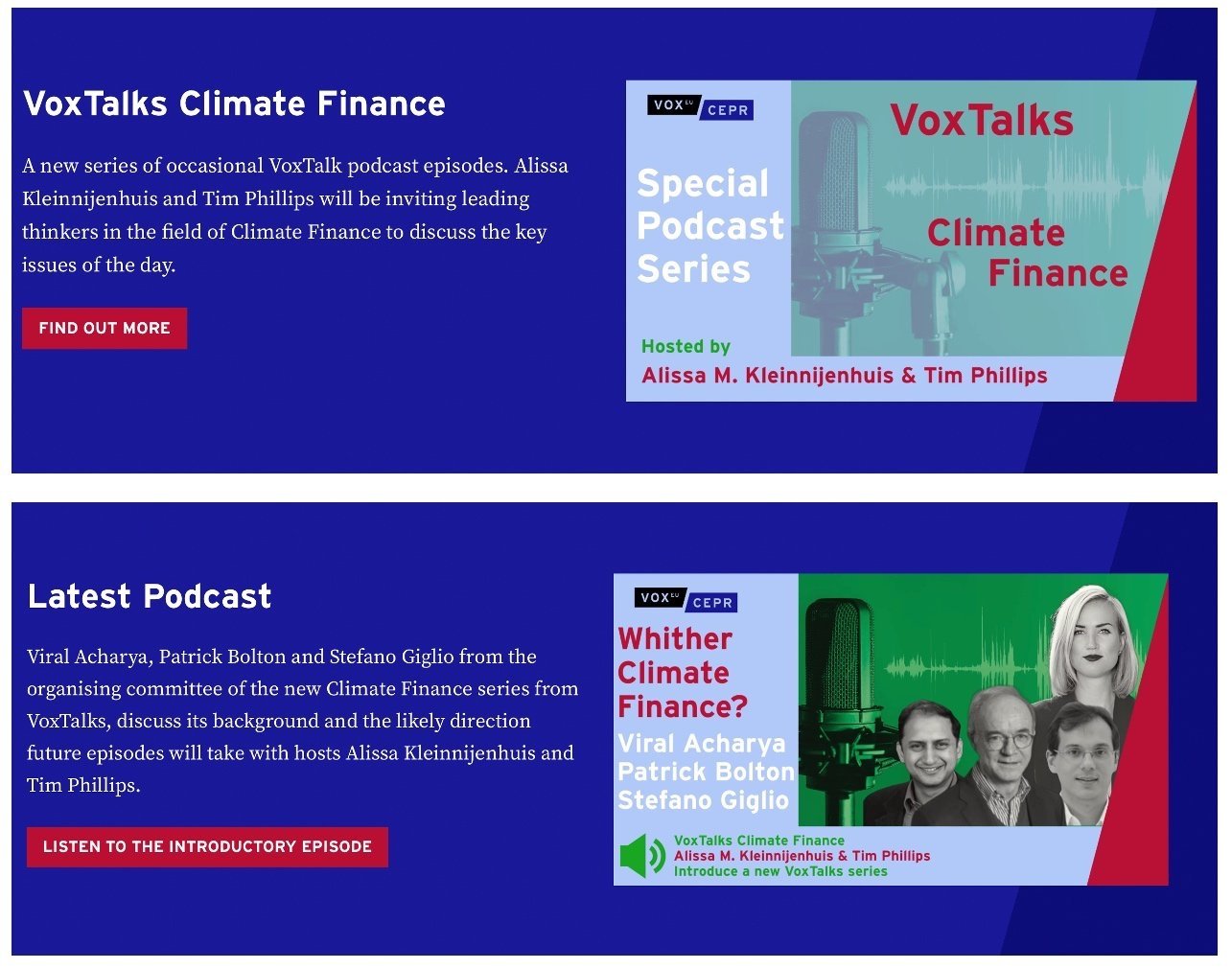VoxTalks Climate Finance
VoxTalks Climate Finance seeks to play a formative role in covering the debates at the frontiers of the field that will shape the future of finance when it comes to climate.
Episodes in VoxTalks Climate Finance cover groundbreaking new research in academia, leading developments in public policy and private capital markets at the intersection of climate and finance, including the role that finance plays in pricing climate risks and aligning finance flows with low greenhouse gas emissions and climate-resilient sustainable development. The episodes provide a platform for the debates that must be had to make finance integral to the sustainable climate solution.
Subscribe to VoxTalks Climate Finance at Spotify here (other listening channels here).
VoxTalks Climate Finance is part of CEPR’s VoxTalks Economics.
The Climate Tipping Points Implications for Finance
If the climate crosses any of a number of tipping points, what are the implications for climate finance? Tipping points are large, probably irreversible, changes in nature that may occur as a result of the increase in global temperature. Worse, crossing one tipping point may cause a cascade of others.
Alissa and Tim talk to Professor Tim Lenton, one of the authors of the Global Tipping Points Report, and Professor Patrick Bolton about how Climate Finance struggles to price the risk of tipping points.
Timothy Lenton is one of the world’s most renowned climate scientists famous for his scholarship on climate tipping points and planetary boundaries. Patrick Bolton is one of the most renowned scholars in climate finance. In this conversation, the latest climate science evidence is brought to bear on finance.
The Role of Business and Business Schools in Sustainability
If economics and finance are the key to creating a sustainable way to live, what is the role of business schools in training the people who will make that happen? Alissa and Tim talk to Peter Tufano (Professor of Finance at the Harvard Business School & Former Dean of the Oxford Saïd Business School; Senior Advisor, Salata Institute for Climate and Sustainability, Harvard University) about how they should be taking the lead in teaching the tools of climate finance. They also discuss his research into what the public thinks the role of business in society should be – and how that has diverged from what business schools teach.
Mispriced risk and the end of ESG
Are markets acting efficiently when they price carbon risk? Alex Edmans (Professor of Finance at the London Business School) talks to Alissa Kleinnijenhuis and Tim Phillips about how the earnings announcements of high emitters suggest mispricing of transition risk and argues that we should think of ESG is both extremely important – and nothing special. Alex argues that climate risk is like any other risk that affects the long-term value of the firm. Given the magnitude of potentially catastrophic climate risks involved, is that the right way to think about it?
Climate Finance Instruments
Frédéric Samama has pioneered the development and introduction of instruments that make climate finance not only possible, but practical. He tells Alissa Kleinnijenhuis and Tim Phillips about his research, and how investors can incentivise firms to decarbonise.
Frédéric's latest innovation is a Net-Zero version of the S&P 500 index, called the "S&P 500 Net Zero 2050 Paris-Aligned ESG+ Index." The truly innovative and appealing features of this index are as follows:
Initially, the constituents of the net-zero (NZ) index mirror those of the S&P 500.
Over time, the S&P 500 NZ index follows a decarbonization pathway to align its total emissions with the 1.5-degree temperature target.
This entails removing companies with the highest emissions from the index according to a predefined schedule unless they decarbonize.
Thus, the Net-Zero version of the S&P 500 index combines divestment and engagement. Investors can use their voice to encourage corporations in the index to decarbonize, but high-emitting corporations will be divested if they fail to do so.
As the NZ index grows, the impact of divestment on the cost of capital for these corporations increases.
Frédéric's innovation is the first financial product to explicitly address the time urgency of the NZ goal, considering the rapid depletion of the carbon budget, and it boasts a low tracking error.
Solving the wickedest problem
In the brief history of climate finance, Professor Andrew Karolyi (Dean of the Cornell SC Johnson College of Business, Cornell University) has been one of the pioneers, both as an author and a catalyst to encourage other finance experts to become involved. He talks to Alissa M. Kleinnijenhuis and Tim Phillips about what inspired him to take on what he calls “the wickedest of wicked problems”, how he kickstarted research on the topic, and the little-known involvement of King Charles III in the genesis of climate finance.
What is the purpose of the company?
In 1970 Milton Friedman told us that “The Social Responsibility of Business Is to Increase Its profits.” Faced with climate change, is that still the right objective for a company, and what could replace it? Professor Dirk Schoenmaker, one of the authors of “Corporate Finance for Long-Term Value” talks to Alissa M. Kleinnijenhuis and Tim Phillips.
Is there a market for biodiversity?
Climate change will have an impact on the natural environment, and the natural environment will affect the rate of climate change. Is biodiversity risk reflected in asset prices? Is it possible to use private capital to finance biodiversity conservation and restoration, and what can that achieve? Alissa Kleinnijenhuis and Tim Phillips talk to Professors Johannes Stroebel (New York University) and Caroline Flammer (Columbia University).
Whither Climate Finance?
Climate finance is an essential part of the fight against climate change. Join co-hosts Alissa Kleinnijenhuis and Tim Phillips for the important debates in climate finance, with the researchers and policymakers who are making a difference. In our introductory episode "Whither Climate Finance?” we ask: What problems can climate finance solve, and how do we solve them? With guests Professors Patrick Bolton (Imperial College London), Viral Acharya (New York University), and Stefano Giglio (Yale University).







